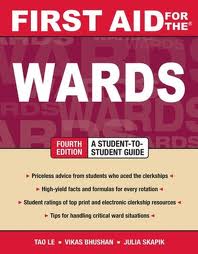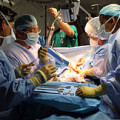This post is part of our series on the best books and resources to help you perform well on your third year rotations and shelf exams. Also check out our lists for clerkships in Internal Medicine, Family Medicine, OB/GYN, General Surgery, Neurology, Psychiatry, Pediatrics, and Emergency Medicine. You can also check out our complete list of "Best Books" lists for medical students here.
Background: Clerkship Grades
At the beginning of each of these clerkship lists there are a few things I must say. First, your grade on clinical rotations will depend on both your clinical performance and your performance on a shelf exam at the end of the rotation. While it is true that how you work with your teams and patients will play into your evaluation, there is no denying that your knowledge of the subject matter is, by far, the most important part of your final grade because it directly affects both of these two areas of evaluation. As a resident, I currently find myself filling out medical student evaluations every week. There are very few 'incredible' medical students and very few 'terrible' medical students. The vast majority of you (~95%) fit into the "good and easy to work with" group; the only thing you have to set you apart from others is your knowledge base. You have no alternative but to study! First Aid for the Wards is a great resource to understand the dynamics of your clinical rotations, I highly recommend it.
Essential Resources
The resources I will describe in the clerkship lists are books and online question banks. From the onset let me point out two indespesible resources that I will not list for each rotation individually.
- First, I consider a great online question bank essential. Both Kaplan and USMLE World are very good products. I highly recommend purchasing a one year subscription to one of these USMLE Step 2 question banks. As you complete your third year rotations, these question banks will prepare you for 1- your clinical duties, 2- your rotation shelf exam, and 3- the USMLE Step 2 during your fourth year.
- Second, online review materials (e.g. Medscape, UpToDate, etc.) are essential resources to prepare for your patients in the hospital. The books and question banks can never provide the type of in-depth detail about disease processes that you will need to learn how to properly take care of your specific patients. To be a great medical student, you must prepare more profoundly for the diseases you are encountering personally in the hospital.
Book Series for Third Year
Medical students are not all made the same; we are all very different learners. There are a number of companies producing review materials for third year medical students, each with a slightly different focus. Each of these companies produce a different book for each clerkship. Interestingly, some companies' books are rated higher in some clerkships than others. If you find a product that works for you, consider sticking with it during your third year even if that product is not 'rated' as highly for a specific clerkship. Below are a few of the review products and their features.
-
The Case Files Series
: A unique teaching model; the Case Files series introduces a number of important clinical cases and follows them up with clinical pearls and important concepts. For students who need vivid clinical situations to remember factoids and concepts, this is a great series. (Case Files Surgery
)
-
The PreTest Series
: The PreTest series is a classic question bank format with questions and detailed explanations. As I previously mentioned, I believe there is no substitute for a great question bank. While an online resource (USMLE World or Kaplan) can be more robust and mobile, a good question book is still a great option. The PreTest series produces a couple fantastic question banks. (PreTest Surgery
).
-
The BluePrints Series
: The BluePrints series has a beautiful format that is very easy to read. The text is laid out in a bulleted lists, but with more details and descriptions than the First Aid series with which most students are familiar. I think very highly of these review books. (Blueprints Surgery
).
-
First Aid Clerkship Series
: The First Aid series well known to most students also produces review books for third year clerkships. The content is similar to what students are used to, bulleted lists of high yield information. While I highly recommend many of the First Aid review books for USMLE Step preparation, the books are not quite as widely read and recommended for clerkships. (First Aid Surgery
).
Best Books for General Surgery Rotation
So, we can agree that books are not sufficient for success on your clerkships, but they are still an incredible resource that you should tap into. Let's review the best books and resources for your General Surgery rotation. These lists come from both my experience and also from one medical school's annual survey of its 250 graduating medical students who try to detail which resources were the most useful on their rotations.
The General Surgery clerkship is unique in that the most highly recommended books and resources are completely different than for all other rotations. In fact, none of the book series mentioned above are very highly recommended for the general surgery rotation. One reason for the difference is that you will not only have to prepare for the shelf exam and hospital rounds, but you will also need to prepare for pimping in the OR, which is a total different animal. Below are some resources that will help
1. Dr. Pestana's Surgical Notes:
|
|
2. NMS Surgical Casebook:
|
|
3. Surgical Recall:
|
|
4. Case Files Surgery:
|
|








 My name is Andrew and I am a first year resident training to be an ophthalmologist. I created ShortWhiteCoats to provide medical students, residents, and the public with all the information I spent so many hours looking for during medical school.
My name is Andrew and I am a first year resident training to be an ophthalmologist. I created ShortWhiteCoats to provide medical students, residents, and the public with all the information I spent so many hours looking for during medical school.







